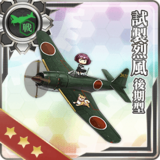- Welcome to the Kancolle Wiki!
- If you have any questions regarding site content, account registration, etc., please visit the KanColle Wiki Discord
Reppuu
| This article is a disambiguation page for Reppuu
Please use the following links below to direct to the element of interest. |
- The equipment named "Reppuu" (烈風) was renamed to "Prototype Reppuu Late Model
 " (試製烈風 後期型) (2019-03-08).
" (試製烈風 後期型) (2019-03-08).
The Mitsubishi A7M Reppū ("Strong Gale") is a family of Japanese fighters:
 Prototype Reppuu Late Model (previously "Reppuu" (烈風))
Prototype Reppuu Late Model (previously "Reppuu" (烈風)) Reppuu Model 11 (previously "Reppuu Kai" (烈風改))
Reppuu Model 11 (previously "Reppuu Kai" (烈風改)) Reppuu (601 Air Group)
Reppuu (601 Air Group) Reppuu Kai
Reppuu Kai Reppuu Kai (352 Air Group/Skilled)
Reppuu Kai (352 Air Group/Skilled) Reppuu Kai (Prototype Carrier-based Model)
Reppuu Kai (Prototype Carrier-based Model) Reppuu Kai 2
Reppuu Kai 2 Reppuu Kai 2 (CarDiv 1/Skilled) (never released)
Reppuu Kai 2 (CarDiv 1/Skilled) (never released) Reppuu Kai 2 Model E
Reppuu Kai 2 Model E Reppuu Kai 2 Model E (CarDiv 1/Skilled)
Reppuu Kai 2 Model E (CarDiv 1/Skilled)
Trivia
The Mitsubishi A7M Reppū ("Strong Gale", Allied reporting name "Sam") was a naval fighter developed as a successor to the infamous A6M Zero.
The result of the 17-shi carrier-based fighter specification, the Zero's successor (then referred to as Navy Experimental Type 17 Type-A) was expected to be able to climb to 6 000 m in less than 6 min and then fly above that altitude at 639 km/h, all while carrying two 20 mm cannons and two 13 mm machine guns and retaining the A6M3's impressive maneuverability.
The Reppū's development was delayed due to development issues related to the engine and airframe, as well as production prioritizing other aircraft.
The A7M1 Reppū prototype finally flew in May 1944, demonstrating excellent handling and maneuverability but could not attain its lofty 640 km/h target due to the underpowered NK9 engine. The Navy ordered development stopped due to the failure, but Mitsubishi obtained permission to test the aircraft with the MK9 engine.
The A7M2 prototype flew in October 1944, achieving a top speed of 628 km/h while surpassing the Zero in many metrics, leading the Navy to officially adopt the type. Saburo Sakai declared it was the finest fighter he had ever seen, while engineers claimed it could fight at altitudes up to 12 km.
The Reppū was expected to replace the Zero as the standard fighter of the IJN, but production was disrupted due to earthquakes, Allied bombings, and the loss of schematics and manufacturing jigs. The Reppū subsequently never flew in combat.
The A7M3-J "Reppū Kai" was a proposed interceptor variant of the Reppū, with an increased maximum speed of 648 km/h using a 2 200 hp forced-induction version of the Mitsubishi MK9 and an armament consisting of six 30 mm cannons. No working prototype was ever produced, the design documents being lost in the bombings of March 1944.
